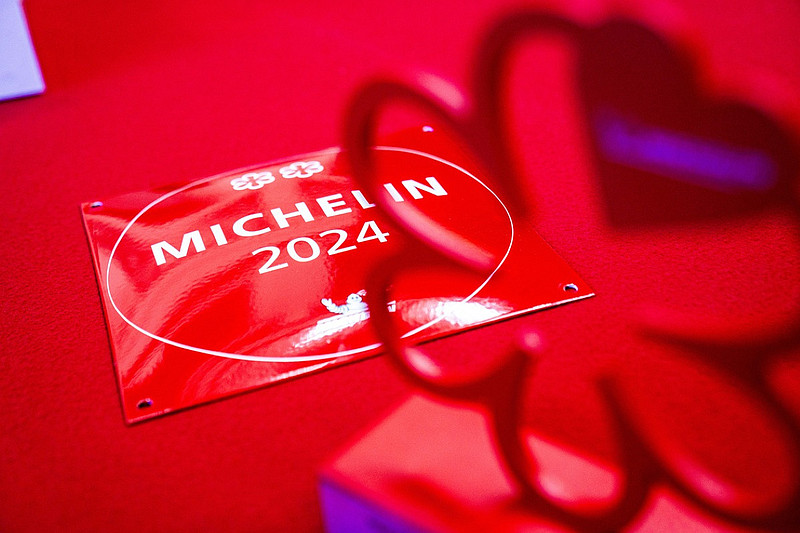Interview
Ralf Flinkenflügel: "It's all about quality, that's the be-all and end-all"
The sounds of the closing music of the star ceremony in the Hamburg Chamber of Commerce had not yet completely faded away when we were able to conduct an interview with the director of the Guide Michelin editions for German-speaking countries, Ralf Flinkenflügel, via an online link.
Restaurant-Ranglisten.de:The star ceremony ended a few minutes ago. My first impression: there are surprisingly few new two-star restaurants and you've found lots of new one-star restaurants that I, at least, didn't have on my radar. How would you summarise the test season for the Guide 2024?
Ralf Flinkenflügel: We are actually positively surprised. Many sectors have fought hard. Of course, this also includes the catering industry. Inflation, a shortage of skilled labour, a weakening economy, rising energy prices - the fact that we have a new record number of stars is remarkable considering the situation.
RR:Among the newly starred restaurants are a number that only opened a few months ago. In recent years, established three-star restaurants have also lost their third star. Has the Michelin become more agile and reacts more quickly to developments in the restaurants?
RF: I think that's the right way to go. If someone offers very good cuisine, then it simply doesn't make sense to wait two or three years to tell our readers: Here is someone, here is a restaurant that deserves special attention.
RR:Do you look at the overall list before publication to see if everything is well balanced, regionally, or in terms of men and women or other factors?
RF: No, our criteria are not based on regions or lists. It's all about quality, that's the be-all and end-all.
RF:Did you notice any new trends and developments in your 2023 tests?
RF: I've been asked about trends for 15 years. Trends develop gradually. There is still a trend for upmarket restaurants to be more relaxed, casual and laid-back. Sustainability is also a factor that plays into this.
RR:I'll come back to the topic of sustainability in a moment. However, I have noticed that the number of independent chefs with a Michelin star is increasing. As a result, the economic risk has to be managed due to the high costs of high-quality catering in terms of products and staff. This is sometimes accompanied by restrictions for the guest. A menu without the option to swap, fixed start times, possibly a ticket system, etc. Does this bother you, or would there be no other way to combine quality and profitability?
RF: Profitability is of course very important. The fact that many, many young chefs have the courage to set up their own business, especially in these times, is something to be highly respected. I have to be honest, it's quite a bold step. Some are taking this step and are also very successful, as we have seen today.
RR: How has the 'green star' developed for you? Initially, there was a lot of criticism because you have to rely on the information provided by the restaurateurs in some places and, unlike with the traditional stars, you can't just rate the quality on the plate.
RF: We apply fairly strict standards. There are three steps. If we see a restaurant that is particularly committed in this direction - we talk about lighthouses internally - we send it a questionnaire. We analyse it to see what initiatives the restaurant is taking. We then visit the restaurant. It is important that the staff are trained accordingly and communicate to the guests what is being done and the philosophy behind it. Finally, we talk to the restaurateurs in person to get more background information. It's not that easy to be included in the category. In the last two years, I haven't heard any criticism of the procedure. Of course, we can't check whether the waste is separated properly, so we have to rely to a certain extent on the honesty of the restaurateurs. But as a guest, you can definitely tell whether a restaurant is green or whether it's just a fake scam.
RR: Your team of inspectors is facing the big task of testing restaurants throughout Austria again in the coming months. The guide is due to be published in 2025. How are things progressing? How is it going organisationally, as there are several hundred restaurants to be tested according to the comparative standards of the other guides?
RF: We're looking forward to it! We've been travelling for a few weeks. I've already been there myself. We now have our first impressions and they are very positive. I was in a region where I was last there ten years ago and I have to say: it was amazing what I experienced there. But of course these impressions need to be confirmed. We have increased our staffing levels. We also receive intensive support from inspectors from other countries, such as France, the UK and Italy. This is working well and we are in good spirits.
RR: Will the extra work have an impact on the intensity of testing in Germany? Will it be more difficult for new restaurants to get into the 2025 Guide?
RF: Not at all. We have changed a lot in the last three or four years in terms of the international exchange of inspectors. We have inspectors from Japan, South Korea, North America and all over Europe. We exchange ideas. That works wonderfully.
RR: We are talking to each other via Teams app shortly after the ceremony. The chefs are celebrating - you're not there. Why?
RF: It's not desirable for the directors and inspectors to appear in public in any way. Sure, I've been there for a few years, some of the chefs know my face. But I have to be honest, I'm never comfortable being recognised and called by name. We simply want to avoid that.




